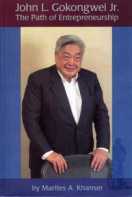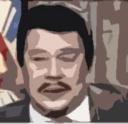Selections from my Franciscan essays (hover cursor over link for source or click for full article)
‘Entrepreneur On A Bicycle? John Gokongwei Jr Was Having Twice The Fun’
 Watermarking your book with young John Gokongwei Jr riding his bicycle: Are you saying this is the boy image of entrepreneurship? The boy didn’t even know the word existed. He had to buy & sell for his family to survive. Then, at 15 years of age, he started taking risks. That was when within the teenager, entrepreneurship was born. The bicycle was a ride, not a risk.
Watermarking your book with young John Gokongwei Jr riding his bicycle: Are you saying this is the boy image of entrepreneurship? The boy didn’t even know the word existed. He had to buy & sell for his family to survive. Then, at 15 years of age, he started taking risks. That was when within the teenager, entrepreneurship was born. The bicycle was a ride, not a risk.
There is that risk of writing in hindsight on someone who has been hugely successful in business: You attribute his present success to his knowledge in the past, what he has learned in the course of time to what he was going to learn yet. You gloss over his learning process. He was born a genius; his genius lies in entrepreneurship – he was born with a silver spoonful of risk in his mouth.
I rate Marites A Kahnser’s book, John L Gokongwei Jr: The Path of Entrepreneurship (2007, Quezon City: Ateneo de Manila University, 244 pages) a 7.5 where 10 is Top. It is well-researched; the story told is in effect corroborated by testimonies of two men of high merit: Washington SyCip and Gabriel Singson; it summarizes the life of the subject in one appropriate word: entrepreneur; it is imbued with the proper business perspective, as far as I can tell; certainly, it has the big words like ‘entrepreneurial mind’ and ‘theoretical perspectives’ – an ambitious book, which is all to the good. But the book does full justice neither to the whole story of Mr John (as he is fondly called) and his emergence from boy seller to boy buyer & seller, the time when his entrepreneurship seized him as he seized the handlebars of his bicycle, nor his capacity to take risk and learn along the way to success, surviving failure. The successes are important; so are the failures – and the learning along the way. I doubt there are entrepreneurs who have never failed. If you claim to be an entrepreneur and have always enjoyed success, you are not an entrepreneur: you are simply a businessman who is afraid to take risks.
Mr John didn’t begin with the mind of an entrepreneur. He began with the mind of a dreamer. And that’s how all entrepreneurships begin, as a dream, a dream that would not go away. Dreaming of the life of the rich. In Mr John’s boyhood, his first 13 years were ‘a life of privilege’ (page 42). ‘He lived in a big house, studied in the big school in Cebu, and had unlimited access to an air-conditioned movie house.’ (They owned it.) Rich is nicer. ‘I’ve been rich, I’ve been poor.’ says Frank Sinatra, ‘Believe me brother, rich is better!’
So, by his own admission, years earlier it was his mother (and necessity) who invented an entrepreneur out of John Gokongwei Jr riding a bicycle. But first, those wheels did not travel the path of entrepreneurship – first, they traveled the path of earning a living.
Entrepreneurship goes beyond buying & selling; entrepreneurship is a ‘willingness to take the risks involved in starting and managing a business’ (turnerlearning.com). To my mind, the defining factor is that entrepreneurs take bigger and greater risks; perhaps, they don’t know when to stop, or where, or with whom, which explains some failures. If I am wrong, then there are thousands of entrepreneurs in the streets today, and we continue to insult them by calling them sidewalk vendors or ambulant peddlers.
The boy John was an ambulant peddler, the boy buyer & seller with a bicycle. When he began, he was also the head of the family. Although he had never heard the word entrepreneurship, he discovered that he had the heart and head of an entrepreneur. You need the heart to be able to take the risk, you need the head to understand the risk and do what has to be done. Again and again. Add to entrepreneurship faith and hope; Mr John affirms this with the names of two of his daughters Hope and Faith (xxxvii, in a middle-of-the-book insert of photographs). Twins? Unfortunately, the book doesn’t say one way or the other. As far as I’m concerned, Faith and Hope are twins – you cannot have one without the other in business as in life.
When the Pacific War broke out in 1941, my first job was to sell the peanuts that my mother would cook in the backyard of our tiny rented home. I would also buy candles, thread, and soap, and travel a few miles to the next town on bicycle to a marketplace where I would lay these goods out on a table, and compete for customers with vendors twice my age and size. These were exhilarating times for me; I not only earned enough money to support my family (in China); I also discovered that I could live by my wits and hard work. I was working while my peers were all playing, but I always thought I was having twice their fun. (xv)
The boy was taking risks.
Entrepreneurs as risk takers also need other risk takers or they will not survive and succeed. In 1955, Mr John saw business in cornstarch, but he had no capital, no big company, no track record, no banking acquaintance (pages 64-65). But he was young, 35 years old; he had hope within himself and faith in other people. The first bank he approached for a loan turned him down: Bank of Communications. He tried again. This time, China Bank granted him a loan of half a million pesos. DK Chiong, President of the bank, would say later why he and Albino SyCip, Chairman of the Board, granted that huge loan to the young Mr John despite himself, saying it was ‘something about knowing a good man when he saw one’ (page 65). Mr DK was taking a calculated risk too. Mr John was lucky – ‘Who takes calculated risks with geniuses?’ is my rhetorical question.
The author quotes Mr John as saying that Filipinos will be encouraged to become entrepreneurs if these conditions are met:
(1) access to short-term and long-term capital
(2) better labor management
(3) cheaper energy – electrical power and gasoline
(4) agricultural productivity management
(5) foreign exchange management.
That may be so, but that’s the wisdom of hindsight. Mr John, you needed none of those to become one of the most highly successful entrepreneurs of the Philippines. What we have to learn is to take risk despite.
Interestingly, TAU (the author unnamed) explains that C2 is an excellent example of a consumer product launched using a Blue Ocean Strategy. ‘Simply put, a Blue Ocean Strategy is developing uncontested market space that makes your competition irrelevant.’
I don’t think so, TAU. In fact, by definition, in the Blue Ocean Strategy, there is no competition, nothing but ‘uncontested market space.’ C2 is green tea that doesn’t make the other guy irrelevant but green with envy. And, TAU, ‘Blue Ocean’ is a silly metaphor; you don’t put your product to the test in the sea, unless it’s for the fish. But if you insist, the fish won’t bite unless it’s to their taste and liking. Yes, in the ocean, the entrepreneur takes the risk and casts the fly, but the fish is always right.
Simply put, C2 is Mr John taking a new risk, riding a bicycle with wings to a new market. He is 81 this year; with C2, he is showing the risk takers he is more entrepreneurial than 100 of the young ones combined. Mr John is having more than twice the fun now. He deserves it.


